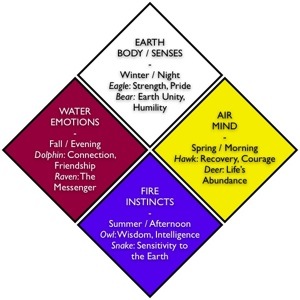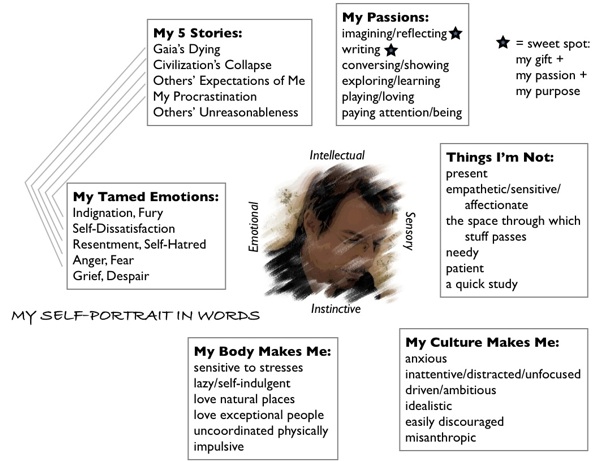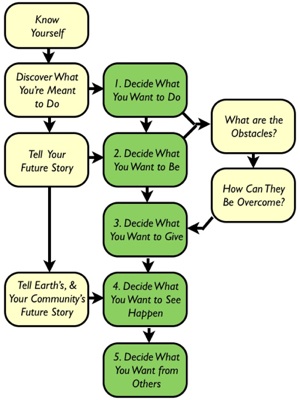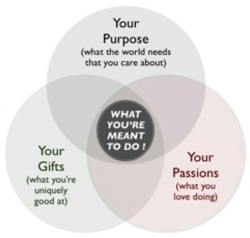| I‘m back from a wonderful vacation in Oregon, and feeling very centred. I feel in touch with my emotions, my senses, and my instincts, and they are guiding me in my decisions and reflections as much as my intellectual thinking. Most of my life I have made decisions in my head, ‘rationally’, and then wondered later why they don’t ‘feel’ right. It is important, I think, to find a balance between our four ‘ways of knowing’ (mind, emotions, senses, instincts) before deciding what to do.
My current preoccupation is deciding ‘What I Want’. This is more than just what I want to do; it also includes what I have to learn in order to do these things, what I (realistically) want to (see) happen, and what I want from others. By implication it also means where and with whom I want these things to happen. It includes but is not limited to what I need. I think most of us rarely get around to thinking about what we want, because we are so caught up in the needs of the moment, our ‘to do’ lists and what is urgent (but generally not, in the greater scheme of things, really important). Those who see us as employees, customers, and voters, like to keep us too busy to really think about what we want, because this makes it more likely they can persuade us, thought-less-ly, that what we want is what they want — for us to work hard and ‘perform’ well on the job, to buy stuff we don’t really need, and to give them power to make decisions for us. Even when we believe we are acting in our self-interest we often discover that this binds us to future actions that we did not realize and which we do not really want to do. What seemed at the time like decisions based on enlightened self-interest often turn out to be foolish naivete, and regrettable. Or we may be bound, by poverty or illness (ours or loved ones’), to spend our whole lives doing what we must, not what we want. We are all caught up in this vortex of inattention to what’s really important: When I speak with business and political ‘leaders’ they all lament the lack of time to really think about what’s important rather than what’s urgent. I’ve been blessed with the capacity and time to think about what’s important, even though this often means I get criticized for not dealing with urgent things. I’ve had the opportunity, therefore, to take what I think is the first step towards deciding ‘What I Want’, which is self-knowledge, summarized in my recent ‘self-portrait in words’: Once you know who you are, I think, you can know what you want. What do I mean by ‘want’?
The word ‘want’ is, er, wanting, since it literally means ‘deficiency’. It might be easier to delineate the categories of ‘wants’ rather than trying to define the term. I think there are five categories, that are best listed as questions:
A ‘want’, then, is an overcomable deficiency (something that is not currently present or happening) coupled with a realistic intention (to do what we can to make it happen). You may of course want some things simply to continue, but that probably suggests that there is a real risk they will not, that they will soon become deficiencies. Also, if the deficiency can’t realistically be overcome, or if the intention to do something about it is unrealistic, then it’s a dream, not a want. I’ve learned enough about human nature and how our mental models work not to prescribe a methodology to others for determining answers to the five questions above. But here’s the process I used, in case it’s of any value to you: First, I reviewed my ‘self-portrait in words’ (second graphic above), my knowledge of who I am now. I focused especially on the 6 groups of things I love doing, in the upper right, but I also considered what I’m not (centre-right box), and also the 12 characteristics of myself (lower boxes) that I don’t believe I can change. I did this to appreciate what I cannot reasonably want to do or be (I’m not a believer in ‘self-improvement’ or that we can really be other than who we really are). And I considered my five stories (upper left) and the emotions they unleash in me (centre left), since the stories we tell ourselves inform, influence and inhibit what we want to do, and what we think we can do. Next, I reconsidered what I’m ‘meant to do’. To do this I used the model below from my book Finding the Sweet Spot, but expanded my thinking to all the things I’m meant to do, for myself and my communities, not just things I’ meant to do ‘at work’. I slotted the 6 groups of things I love doing into the ‘passions’ circle. I put the first (imagining/reflecting) and second (writing) in the sweet spot in the centre of the three circles. I put the third (conversing/showing) at the intersection of ‘your purpose’ and ‘your passions’ (I’m not that good at this). I put the fourth (exploring/learning) at the intersection of ‘your gifts’ and ‘your passions’ (I’m not sure the world needs this gift). And finally, I put the fifth (playing/loving) and sixth (paying attention/being) just inside the ‘your passions’ circle (these are my enjoyable incompetencies). I started to make a list of the things that I believe the world needs most, things like fewer people, an end to fossil fuel consumption and factory farms, more (and more appreciation of) wilderness, love, complexity, and self-sufficient communities. The hard part was trying to figure out how any of my 6 groups of passions could contribute to meeting any of these needs. Trying to close down the Alberta Tar Sands, or make factory farming, dams, nuclear plants, coal-burning power plants or logging of old-growth forests illegal, or develop easier, more reliable birth control, or eradicate poverty, or improve education, or create model sustainable intentional communities — these are all worthy objectives and tasks, but they’re just not things that I’m either passionate (enough) about or competent about to make my involvement in them fruitful. It’s not that I don’t care passionately about these causes; it’s more that I don’t believe there is anything I can do about them that would be effective, even working in concert with others. I’m profoundly cynical about the political, legal, economic and educational systems, and don’t believe they can be reformed, or that working within them can achieve anything durable, though I profoundly respect and admire those who fight the good fight to prevent them being exploited more than they already are. I’m equally skeptical of the scalability of good programs, practices and models developed and implemented bottom-up. The transmissability (to use a viral marketing term) of even the most compelling, proven models is just too low. Advertising, loathsome as it is, brings about behaviour change because it’s simple, polished and relentless, and the models of better ways of living that most need to be promulgated around the world are subtle, imperfect and complex. People put Exxon Mobil gas in their tanks because it’s easy, and they don’t establish community-based renewable energy co-ops, because that’s hard. Most actions, to be effective, need to be collective, and finding the right partners for the things you’re meant to do is enormously difficult. So it’s no surprise that most of us aren’t doing what we’re meant to do. First, we have to have the knowledge and imagination to discover what we’re meant to do — something that probably isn’t already being done, and probably hasn’t even been conceived of. Secondly, we have to have the capacity to find others who share our purpose and whose gifts complement our own. This is hard work, and it takes a lot of time, and thought. But I’m making progress. Here are some of the things I’ve concluded I want to do (my answers to question 1 above) as a result of this process of knowing myself and what I’m meant to do: WHAT I WANT TO DO: CAPACITY-BUILDING
WHAT I WANT TO DO: ACTIVISM
WHAT I WANT TO DO: PERSONAL TIME AND SPACE
After this, I considered the things I want to be and the things I want to give (my answers to questions 2-3 above). This list was partially informed by the things I want to do, above, and partially informed by a plausible (not idealistic) story I created about myself in the future — how I would behave and act, and what capacities I would demonstrate: WHAT I WANT TO BE
WHAT I WANT TO GIVE
And then finally, I created another plausible future story about the world, and the communities in which I imagine I will live, which allowed me to compile these final two lists of the things I want to see happen in the world, and in my communities, and the things I want from others (my answers to questions 4-5 above): WHAT I WANT TO SEE HAPPEN
WHAT I WANT FROM OTHERS
Considering this list is probably not complete, pending some further thought, I guess I want a lot. But I suppose knowing what we want is a prerequisite to making it happen. How about you? What do you want? How would you answer the five questions above? Category: Let-Self-Change
|









Whew .. that’s a lot of stuff to be monitoring yourself for, whilst you’re deciding (I guess on an ongoing basis ?) whether or not you’re being on purpose about what you want and how you are.I’d get tired by 9h00 am.They say life’s a journey, not a destination. Admirable list … but I keep wondering how much of what you want is whizzing by the “window” of your “vehicle” whilst you’re busy watching out for the signs that you’re finally on the path to what you want and who you are.
Hello Dave, it has been a while… You are asking: “How would you answer the five questions above?”. 1.What do you want to do (actions) with the rest of your life?THIS. And then the next thing. ;-) For me, now, this is: living at the Zen temple, practising Buddhism, helping other people. The odd thing for a Zen practitioner is of course, that what the _specific actions_ are, doesn’t really matter all that much: At the moment, I spend a lot of time cleaning things, bringing stuff to the junkyard and weeding out the garden. But if I’d be building a website or managing the accounts, I’d be just as happy. The direction seems to be more important that the specific actions…2. What do you want to be (behaviours, way of acting, and capacities)?Kind and wise, I guess. Open to anything. Stable. Strong, maybe. Happy. 3. What do you want to give others and the world?What they need. :-)4. What do you want to see happen in the world, that you can realistically influence?What is “the world”, really? If I do my job, _right here_, _right now_, I am already influencing “the world”. For now, that’s enough for me. Maybe later I will have a bigger plan. Or maybe not. ;-)5. What do you want from others, personally, that they have the capacity to give and want to give?I will accept anything they want to give me, but I don’t want anything from them.
I should have shut up and let Jon do the talking. :-)